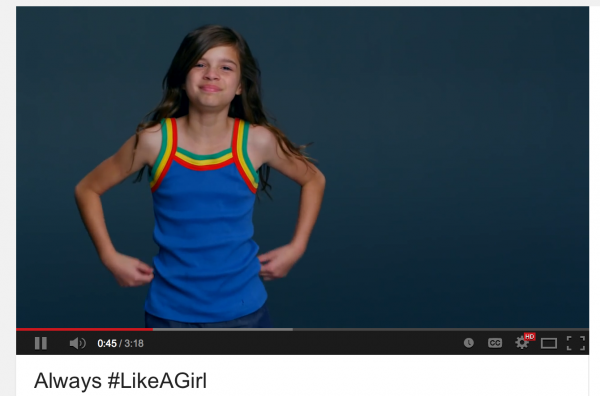Since when did being a girl become an insult?
It’s the question at the center of a new ad campaign by Always — yes, the maker of maxi pads — to empower women and think differently about the way we view ourselves.
Here’s the ad.
Then meet the director.
I’ve watched it several times — tearing up #LikeAGirl every time.
See, I can totally relate. I grew up playing basketball with my guy friends, never aware that these was a gender difference. I could shoot three-pointers, I could nail hook shots, and I could box out like the best of them.
But as I got older, I began to realize that while I may not have seen gender, others did.
I can’t tell you how many times I’d be sitting in the lineup at a surf break and guys would treat me, you know, like a girl. As I’d paddle for a wave, guys who didn’t know me would encourage me, saying, “Paddle harder! You can do it!” as if I had just paddled out for the first time in my life. Or they would take one look at me and think, “Oh, she’s just a girl,” and try to out-paddle me for a wave.
It’s more than annoying, it’s insulting — and not just to me, either.
We live in a world where doing anything #LikeAGirl is bad. It means you’re weak or frivolous or pathetic. (It’s like when people say, “Man up,” like being a man means you’re tough. What would, “Woman up,” mean then…?)
The thing is, I can only do things #LikeAGirl. I run like a girl, I eat like a girl, I cook like a girl, I hike like a girl. Because I am a girl. When did that become a bad thing?
In the ad, adolescent girls, older women, boys and men were asked to demonstrate what it meant to “run like a girl” or “throw like a girl.” And it was heartbreaking to watch women my age respond with negative stereotypes.
But the powerful moment came when girls ages 10 and under answered the same question: they ran as fast as they could, they hit as hard as they could, they didn’t think any differently about the “like a girl” part at all.
“A lot of the girls pre-puberty were completely uninhibited by their identity as a girl,” said Lauren Greenfield, filmmaker and director of the #LikeAGirl video.
So where did we go astray?
It’s so incredibly sad to me that many of us have had our confidence and self-worth eroded at such a young age — and how that lack of self-esteem has tortured us our entire lives. We might not pursue our dreams or start to second-guess our abilities. We might not have tried as hard, we might have expected to fail, we might have felt like our potential was limited.
The worse part is that we might have started to believe our value comes in gender stereotypes, that we have to be, act and look a certain way in order to be valued as a girl or woman — as a human.
It’s so destructive and pointless. Why create artificial barriers to stop people from being their best selves? What would the world gain by that?
Watch the video. Think about it. Then do something — #LikeAGirl.




6 Comments
Hello Cat,
I know some “girls” that can out Standup Paddle me in distance races and I don’t feel bad. More power to them.
Good write Cat. My granddaughter is playing in the Hawaii Kai baseball league, so I asked her how the boys on the team treat her. As a girl or as a fellow player, and she responded as player. She puts out just as much effort as they do, sometimes out hitting a few. I’ve watched her progress from pinto league to mustang, where she is now, and it’s been gratifying to see how she’s handled her self. She’s had several different teams, coaches and players to meet for the first time and play with. To watch how she melds in with these challenges has been so gratifying. So proud of her. She’s FANTASTIC in her Tutu’s eyes. LOL
ALoha Cat
Love this blog. This gives us something to think about! Thanks Cat!
I like it when people encourage me in the line up. More waves for me.
It strikes me that “like a girl” is an expression that originated at a time when women’s clothing was restrictive of movement and when there were few or no organized sports for girls. Decades after Title IX and decent funding for women’s athletics, the expression isn’t much used anymore, not directed at girls anyway. My daughter is 18, and “girly girl” is an expression she’d recognize and might have used, but I doubt that anyone ever told her that she did anything physical “like a girl.” The US women’s teams play at a very high level in international competition, and there isn’t much in the way of big-money women’s professional athletics, but the WNBA is exciting to watch, and the Williams sisters have always looked both powerful and graceful on the tennis court.
Great post. I agree completely with this: “we might have started to believe our value comes in gender stereotypes…” I was raised by parents who never said I couldn’t do something because I was a girl, but somewhere in adolescence, I learned that wasn’t true. Still, I entered very “nontraditional” career fields and, while I did well enough, there was always the unspoken (and sometimes spoken) “for a girl” clause. More articles like yours might reopen the dialogue that seems to have gone dormant for some decades, and make us question where and why these gender stereotypes come from.